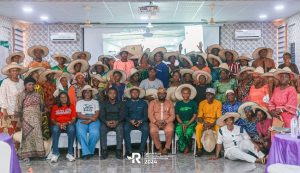Delegates at a conference aimed at bringing community together for climate action are seeking for more local engagement in climate change advocacy.

Held at the instance of the Revamp Rave Network, an environmental protection organisation, on Saturday, February 10, 2024, the conference also sought to train five Lagos coastal communities on protection and preservation of oceans, aquatic and human lives to ensure sustainability.
The communities included Epe, Ikorodu, Agoro-Oyingbo, Mosafejo and Badagry.
Themed “Strengthening the Capacity of Coastal Communities in Climate Adaptation and Mitigation for more Ocean Governance”, the Coastal Rural Community Conference on Climate Change was graced by traditional rulers and artisans from the five communities and representatives of Lagos State Government and Federal Government from the Departments of Fisheries and the Environment.
The founder, Revamp Rave Network, Abimbola Abikoye, who said that the aim of the conference was to educate communities on issues concerning climate change and ocean conservation particularly exploring challenges of the fishing communities, called for more local engagement of rural dwellers in climate change advocacy.
While urging the government and corporate bodies to incorporate community insights into climate change policy-making processes across Africa, Abikoye emphasised the importance of leveraging local knowledge and perspectives in crafting effective climate change mitigation strategies.
She noted that community-driven approaches were essential for creating sustainable policies that resonate with the realities faced by residents in coastal regions.
Abikoye said the programme was also to unravel the hardships the stakeholders were facing, their adaptive capacities and their state of mind to be able to help government to reform policies to capture the needs of communities.
“There is a gap in our policies. Our policies are good, but they don’t often fit into the peculiarities of our situation. And so, climate change is one of the issues that are causing many ecological damages, outside that, they are making communities lose their livelihoods.
“So, this programme is to enhance their capacity, inform them, get to hear from them possible solutions or things they think that they can use to help themselves build more resilience,” she said.
She added that a lot could be achieved through collaboration with government by building capacity for coastal communities and climate change adaptation and mitigation.
Dr Oluseyi Soremikun, Director, United Nations Information Centre, Abuja, who joined virtually, explained the dangers of plastic pollution to fish and the oceans.
He explored issues related to human actions responsible for fish scarcity, flooding, climate change.
He gave details of a research he carried out on Ogun River and discovered that resident misinterpreted flooding of the river with some superstitious beliefs.
He said that fish scarcity was not caused by anger of gods but by environmental infractions and if measures were not taken to check plastic pollution it will affect future generations.
He explained that scientific reasons should be used to back environmental challenges and not superstitious beliefs.
He called for dialogue and action by coastal communities towards protection of the ocean.
Omoragbon Wellington, Director, Department of Fisheries, Federal Ministry of Agriculture and Food Security, was represented by Hunyinbo Sewanu, a director in the ministry.
Sewanu, who delivered a lecture titled “Increasing Artisanal Fishers Knowledge in Adequate Fishing Regulations for More Climate and Ocean Action”, said the justice for the ocean and the environment was a collective responsibility.
“The ocean is crying, it is under pressure,” he said.
He said more than 75 per cent of the fishing community were women and government must be careful to provide alternatives when dislodging them.
He laid emphasis on fish life, ocean life and environment matters, stressing the need for collaboration towards protection, preservation and restoration of the environment.
He stressed the importance of small-scale fishing to include food security, resilience to climate change, economic contribution, biodiversity conservation.
“The demand for fish for and fishery products already put tremendous challenges on resources that are already strained to the limit.
“The participation of the people is necessary for the overall goal to establish integrated approach that will rehabilitate, enhance and sustain fishery resources indefinitely.
“We should be aware that overfishing, climate-change and pollution reduce the productive capacity of the fishery sector, and all tiers of government should partner with Revamp to address issues affecting artisans in the fishery sector,” he said.
A participant, Pastor Raphael Hezekiah from Oworonshoki-Mosafejo community, listed the challenges of his area to include displacement by government and sand dredging, water hyacinth, lack of market, inflation and oppression from fishing trawlers.
“This programme will assist us if governments at federal and state levels will unite and agree with the sponsor of this programme to help the local fishermen,” he said.
Another participant, Mrs Oluwakemi Ogidi from Bayeku in Ikorodu Local Government Area, said the training was able to help her learn clean methods of processing fish without causing air pollution.
